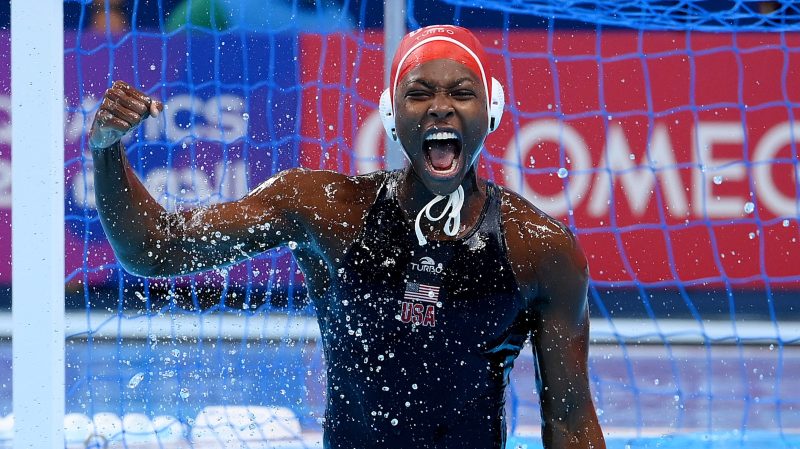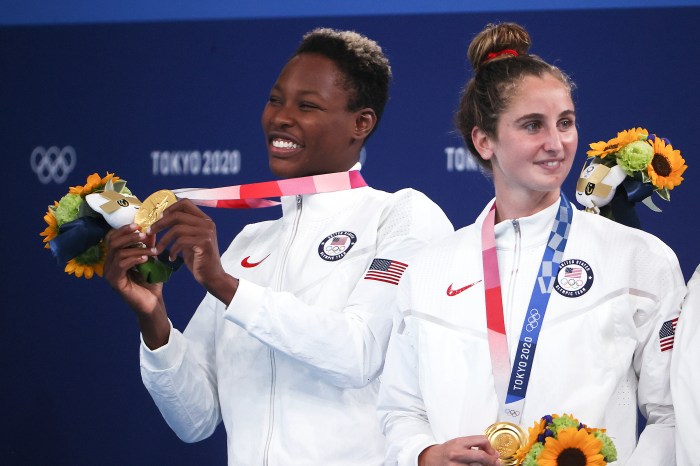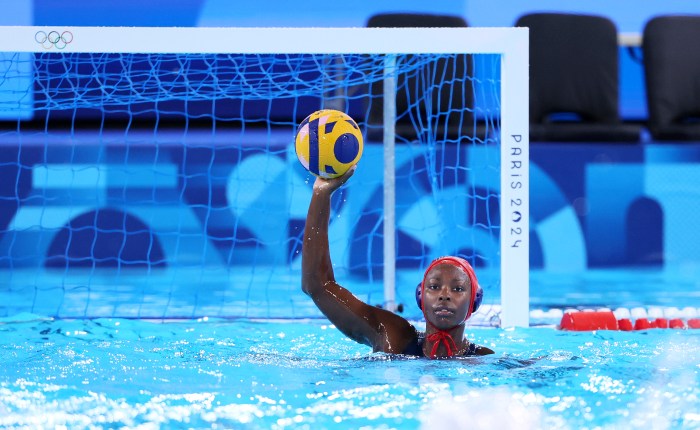Up Next
U.S. water polo goalkeeper Ashleigh Johnson finds joy on her pioneering path
The first African American woman to make the U.S. team has been heartened by guiding other Black girls in the sport

PARIS — These Olympics can be defined as the Games of women’s empowerment, in particular Black women power. There is the historic dominance of the USA women’s basketball team, the seismic impact of gymnast Simone Biles and the quest of sprinter Sha’Carri Richardson to win the gold medal she felt was denied in 2020.
Then there is Ashleigh Johnson, a two-time Olympic champion regarded as one of the greatest goalkeepers in women’s water polo — she made 80 saves at the delayed 2020 Tokyo Games in 2021, more than any other goalkeeper in the women’s and men’s tournaments. Johnson is a mainstay on a dominant U.S. Olympic women’s water polo team going for its fourth consecutive Olympic gold medal.
Johnson helped lead Team USA to gold at the 2016 Rio de Janeiro Games and the delayed 2020 Tokyo Games in 2021. On Saturday, her team opened its title defense with a dominant 15-6 victory over Greece. Johnson recorded 10 saves through three-plus quarters. On Monday, Team USA lost to Spain 13-11 in group play.
Johnson, who played water polo for four years at Princeton, made her first Olympic team when she was 21. Now at 29, Johnson has become a sage, a keeper of the flame, and has cautioned this Olympic team that it has to write its own story.
“The legacy of this team is very strong — the U.S. women’s water polo team has won three consecutive golds, and this is an opportunity to get a fourth one,” she said. “But this specific team, this group of women, has not accomplished anything yet. We have not won a gold medal, we have not been to an Olympic Games. This is our first opportunity to prove ourselves. We’re making our own way and writing our own stories.”
That defines Johnson’s journey from taking local swimming lessons, leading her Miami high school to three consecutive Florida state championships, playing intercollegiate water polo at an Ivy League school and becoming a dominant force in a sport devoid of a Black presence.

Tom Pennington/Getty Images
In 2016, Johnson became the first African American woman to make a U.S. Olympic women’s water polo team. For all of the talk about progress and a misplaced backlash against diversity, Johnson is a testament to the efficacy of diversity and the power of inclusion.
Just ask the opposition. Johnson played four years at Princeton and became the all-time career saves leader. Johnson’s journey was an arduous and lonely learning experience, one that gave her new insights into what other pioneers had to endure to break through previously segregated disciplines.
The greatest challenge was internal, testing her belief in herself. The first was her choice of a college.
“I played the sport through high school and making the decision to go to college for water polo wasn’t easy,” she said. “I chose Princeton, which was a very atypical path for a water polo player, but I was going to play water polo there, which I did for the four years.’’
After her sophomore year, Johnson made the difficult decision to leave college and train to make the U.S. Olympic women’s water polo team. “That decision was difficult because I never saw anybody who looked like me on that team. I never imagined myself doing that. I always wanted that balance between my life and sports, and it felt like making the decision to move to California from New Jersey was a huge decision to leave that balance and let go of that balance in my life.”
She had to overcome self-doubt, but finally tapped into the positive energy of family and friends who encouraged her to make the leap. “I was like, ‘OK, here are all of these people who believe in me, who believe that I can do this. Let me take a chance and believe that I can do this, believe in myself, and just go for it.’ So, I did. I worked hard for two years and ended up making my first Olympic team.”
In many ways, Johnson’s journey defines the journey of every athlete who made an Olympic team in any sport. She was stretched and pushed in ways she could never have imagined. Even the isolation of being a pioneer became strengthening.
“We trained twice a day, we lifted four times a week. It was a lot more than I’d ever done,” Johnson said. “I’m glad that I took the risk, but it was strange.”
As an East Coast transplant on the West Coast, Johnson was a fish out of water. “Water polo is based on the West Coast, so coming from the East Coast and translating what I knew about water polo, how I played to the national team, was a very hard transition. And then being the only one who looked like me, I was like, ‘OK how do I fit in when no one looks like me, no one has my background and then what do I want to take from them? What do I want to give? How open, how vulnerable am I going to be with this team?’ ”
And what would happen if she did all this, made the sacrifices, opened up and still didn’t get the result she wanted?
Johnson discovered that letting go of fear was liberating.
“That was a hard journey,” she said. “But I ended up making the team and also letting go of the fear of not making it, which is hard when you have such a big goal.
“That’s something that a lot of people don’t realize about the Olympic journey. It’s like the tighter you hold onto the fear of not achieving it, the harder it hurts when you don’t get there and the less you actually experience the journey along the way, which is actually the best thing that you get out of it.”

Clive Rose/2024 Getty Images
Three Olympics later, Johnson has become a leader and rock on Team USA. Her mission now, besides helping her team win a fourth consecutive gold medal, is opening up the pathway and bringing more young women who look like her into the sport.
She was heartened in July when the 65-year-old rapper Flavor Flav signed a five-year sponsorship deal to support men’s and women’s water polo national teams.
“I’ve met a lot of young Black girls in my sport. A lot of them connect with me by reaching out on Instagram through USA Water Polo,” Johnson said. “Just sharing stories and encouraging and being a fan of the people who are coming up in our sport, being the voice that’s guiding them telling them that they’re on the right path, they’re doing the right thing, there’s space for you here.
“I think that telling the new story is something that I try to do, saying that we belong here that we excel here and then mentorship. That’s big for me.”
When she was 21 and on the lonely path of the pioneer, Johnson fought hard to find joy in her journey. Today, she said, her joy is abundant.
“I think that finding joy in what you’re doing is all about asking yourself why you are doing this,” she said. “I play because it brings me joy even in a low moment. Like, jumping in the pool is one of the hardest things I do all day, but I reflect on the fact that, as my job I get to play a game with my friends and it’s the same game that I’ve been playing since I was young. The game hasn’t changed, I’ve just gotten better at it, so I play a game that I’m really good at with my friends every day.”
There is also a greater joy at this Olympics than there was at the Tokyo Games when the world was in the throes of a pandemic.
Johnson said there is a lightness and atmosphere of joy that was missing in 2021.
“One of the biggest differences between the Tokyo Olympics and this Olympics are the fact that we are past the pandemic, and that affected a lot of athletes,” she said. “A lot of people were grieving losses, a lot of people were figuring out how to come back from financial losses, social losses and being so distant.
“We didn’t have any interaction with other athletes [in Tokyo]. The Olympic spirit was there, but it was dulled. So, coming into this Olympics, that Olympic spirit has been revived. As much as I’m excited to play, people are excited to go and be a part of the Olympic spirit. There’s been an infusion of energy for all of us.”
Winning a fourth gold medal will bring joy, but so will seeing her sport become more diversified, so will being at peace with whatever results her team achieves.
Joy has become multifaceted.
“The pandemic gave us the proper perspective,” Johnson said. “ ‘OK, I play water polo and I’m an athlete, but what else am I?’ — understanding that you are more than an athlete, you are more than whatever you do for your work. I need to go on a walk every day or I like to cook, I like to read. Getting in touch with those things that bring you joy.’’

